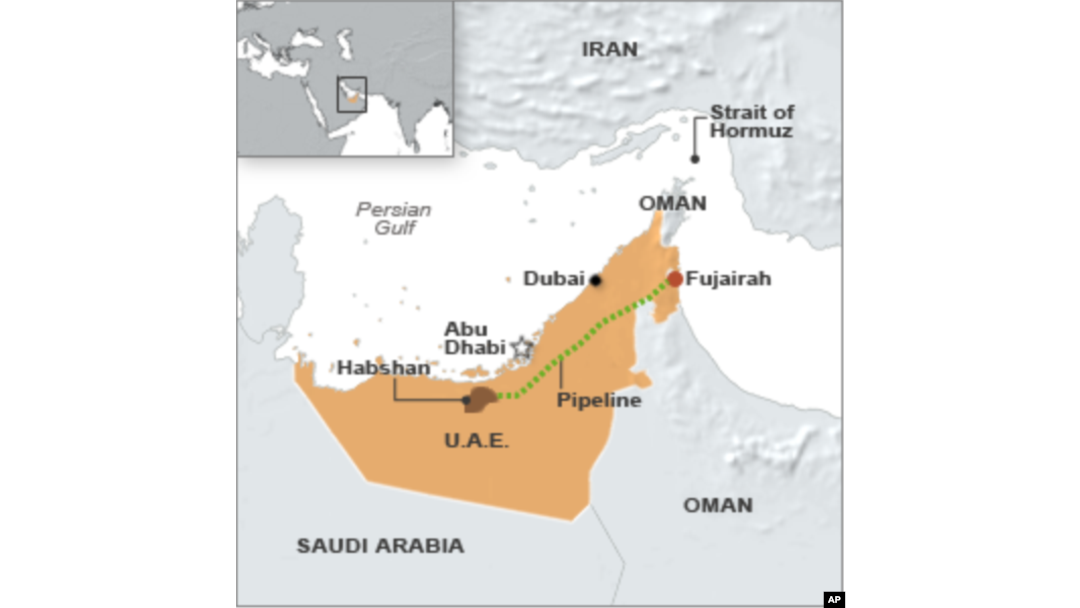As Iranian threats to close the Strait of Hormuz intensify, some energy experts are calling on Arab Gulf states to find alternative ways to export their petroleum. Experts differ, however, on whether proposed pipelines are economically feasible or whether Iran will follow through with its threats.
Nearly 40 percent of seaborne traded oil passes through the Strait of Hormuz, which connects the Persian Gulf to the Indian Ocean and is bordered by Iran and Oman. Iran is threatening to block the route. Any closure of the strategic waterway would likely send oil prices soaring and have a significant impact on the global economy.
Alternatives
Already one Gulf oil producer is opening an alternative route.
Earlier this month, the United Arab Emirates announced that a new pipeline able to pump 1.5 million barrels of oil per day from fields in Abu Dhabi to its Indian Ocean coast should be operating by June. The Emirates currently produces about 2.5 million barrels per day.
Kuwaiti oil expert Mousa Marafi says other Gulf producers should embark on similar projects.
"The pipeline that the UAE is doing is something related to the UAE only," he said. "But this is needed for Kuwaiti exports, for Saudi exports and also for Qatari exports."

Arab Gulf States Urged to Increase Pipelines After Iran's Oil Threats
Iran is vowing to “definitely” close the Strait if further sanctions on its controversial nuclear program prevent it from selling its crude abroad.Sanctions
Western nations have been imposing tighter sanctions against Iran, hoping the moves will force the country to abandon its nuclear work. The West believes Iran’s nuclear program is aimed at building weapons, but Tehran insists it is solely for peaceful purposes.
The European Union agreed to an oil embargo against Iran starting from July. It followed similar sanctions agreed to by the United States.
According to Marafi, the continued threats by Tehran highlight the vulnerability of the Gulf oil producers.
"It’s a warning that you need this pipeline. And we should really do this very soon. This is important for the world altogether," he said.
Impact
Other analysts, however, warn Iran would likely suffer most if the Strait is disrupted.
Iranians are heavily dependent on the shipping channel for trade. Reeling from the current sanctions, Iran is experiencing rapid inflation and currency devaluation.
"The reality is that this neighborhood has lived with a variety of unstable and uncertain circumstances over the history of the last 50 years of the oil industry and never for one moment was the Strait of Hormuz closed," said Sean Evers, managing partner at Gulf Intelligence, who believes Iran is likely to renege on its promise to close the Strait.
Oil analyst Simon Wardell says not enough pipelines could be feasibly built to compensate for the shutdown of the Strait.
"With something in the region of 16 to 17 million barrels a day going through, that’s an awful lot of pipeline capacity you would have to move. So I think whatever happens you’re always going to have substantial volumes of oil flowing through that particular area," he said.
Retaliation
Wardell says the U.S. and other nations would not allow the Strait to be blocked for long. Western allies have announced they would take swift action against any move by Iran to halt oil flow.
"It is going to be in most counties’ interest - China, America, Europe - everyone’s interest really, to make sure the Strait is open so chances are the Strait will remain open," Wardell said.
For the time being, some 17 million barrels of oil flow daily through the Strait as U.S. warships patrol the area to make sure of safe passage.


